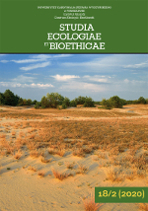Paradoksy wyboru sposobów odżywiania się człowieka
Paradoxes of Choosing Human Diet
Author(s): Katarzyna GóralczykSubject(s): Human Ecology
Published by: Wydawnictwo Naukowe Uniwersytetu Kardynała Stefana Wyszyńskiego w Warszawie
Keywords: conventional food;organic food;varied diet;vegetarian diet;food contamination
Summary/Abstract: People deal with food from the first days of their lives; therefore, it seems that they know all about it, and that they are specialists in this field. However, is that really the case? The aim of this study is to highlight the advantages and disadvantages of various types of diet, to enable the reader to make conscious decisions about which one to choose. Man is evolutionarily, and biologically, adapted to a varied diet, namely, food of animal and vegetable origins. However, more and more people are choosing and promoting vegetarianism, but if that trend were followed by most of the population, crop diversity would suffer, because the demand would be mainly for legumes. Loss of biodiversity would, in turn, lead to the extinction of beneficial insects. Similarly, the decision whether to choose food from conventional or organic production has many implications. It would appear that organic food is always healthier and safer for humans. However, while organic food is certainly free from pesticide contamination, the content of harmful metals in both types of food is similar. Moreover, organic foods can be, to a greater extent, infected with pathogens or susceptible to biological contaminants. Human diet should take into account individual demand for energy, all essential nutrients, including water, but it should also provide pleasure, and reflect the culture of a given region.
Journal: Studia Ecologiae et Bioethicae
- Issue Year: 18/2020
- Issue No: 2
- Page Range: 71-80
- Page Count: 10
- Language: Polish

